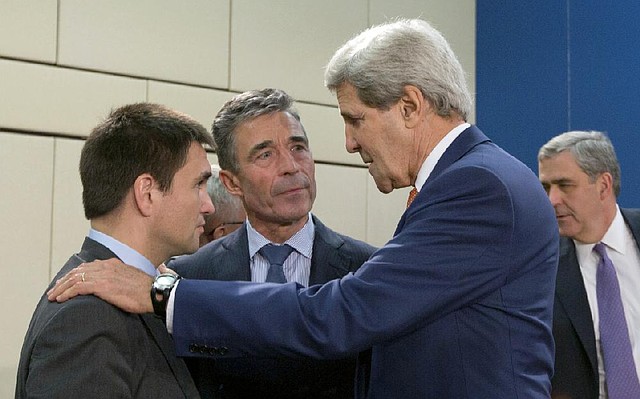Oversight of Ukraine truce urged
In phone call, 4 nations’ leaders press for release of hostages
Ukrainian Foreign Minister Pavlo Klimkin (left) and NATO Secretary-General Anders Fogh Rasmussen (center) talk with U.S. Secretary of State John Kerry at a meeting Wednesday of NATO ministers in Brussels, where Russia was warned it could face further sanctions over the Ukraine crisis.
Thursday, June 26, 2014
MOSCOW -- The leaders of Russia, Ukraine, Germany and France agreed Wednesday that a mechanism needs to be set up to oversee Ukraine's cease-fire, which has been repeatedly interrupted by fighting, and to monitor the securing of its border with Russia.
The four leaders also agreed in a telephone call that hostages held in eastern Ukraine should be freed without delay, said Steffen Seibert, German Chancellor Angela Merkel's spokesman. Observers from the Organization for Security and Cooperation in Europe have been held in Ukraine for weeks.
Seibert didn't say how a cease-fire oversight mechanism might work, but he said talks among Russia, Ukraine and the Organization for Security and Cooperation should continue.
The four leaders spoke after the upper house of the Russian parliament canceled a resolution allowing the use of the military in Ukraine at Russian President Vladimir Putin's request.
Putin has said the cancellation is intended to help support the peace process in Ukraine, which began Friday with a week-long cease-fire. Analysts said the move was intended to avoid a new round of sanctions on Russia at Friday's European Union summit.
In recent days, the cease-fire has appeared to be in jeopardy as violence has continued in parts of eastern Ukraine. On Tuesday, Ukrainian President Petro Poroshenko warned that he may end the truce ahead of time after rebels, who had pledged to respect the cease-fire, used a shoulder-fired missile to down a Ukrainian military helicopter, killing nine servicemen.
Earlier Wednesday, Merkel said Putin's move to rescind the permission for using military force in Ukraine was an "important psychological point." But she also said progress toward a solution remains slow, and the EU is still prepared to increase sanctions on Russia, which the West has accused of supporting the rebellion. Moscow has denied that.
Merkel said the EU will do everything possible to help find a diplomatic resolution, but added that "if nothing else helps, sanctions could return to the daily agenda, and this time at the third level."
Two previous rounds of U.S. and EU sanctions imposed asset freezes and travel bans on members of Putin's inner circle over Russia's annexation of Crimea. The next round would impose penalties for entire sectors of the Russian economy.
Meanwhile, NATO foreign ministers gathered in Brussels, warning that Russia could face further punishment and considering ways to bolster Ukraine's military.
"We are not announcing a new round of sanctions today, but we are going to continue to take steps to prepare in the event that the circumstances on the ground warrant those sanctions," U.S. Secretary of State John Kerry said.
Revoking Putin's authority to use force in Ukraine is "a great step, but it could be reversed in 10 minutes, and everyone knows that," he said.
Speaking after the meeting, NATO's secretary-general, Anders Fogh Rasmussen, urged Russia to "take genuine and effective measures to stop destabilizing Ukraine ... create conditions for the peace plan to be implemented ... end its support for armed separatist groups, and ... stop the flow of weapons and fighters across its borders."
He added that the meeting approved moves to help build Ukraine's military capacities, including by creating trust funds to support defense capacity building in critical areas such as logistics, command and control, and cyberdefense.
On Tuesday, Putin urged Ukraine to extend the truce and sit down for talks with the rebels. He argued that the Ukrainian demand that the insurgents lay down their weapons within a week was unrealistic, explaining that they would be reluctant to disarm for fear of government reprisals.
The Russian leader also called on Ukraine to adopt constitutional amendments and other legal changes that would protect the rights of Russian-speakers in the east.
Poroshenko said he'll present a draft constitution today to Ukrainian and EU officials that seeks to widen regional powers in an attempt to calm the situation in the country's east.
"Our aim is not war; it's not Ukraine who started it," Poroshenko said. "But we are not going to agree to peace at any cost and any conditions."
He said, however, that the Russian parliament's move to cancel its use of force was the result of his peace plan.
Putin made the March 1 request to parliament for authority to use the military in Ukraine days after Ukraine's pro-Russia president was chased from power after months of street protests. Russia sent troops that overran Ukraine's Black Sea peninsula of Crimea, setting the stage for Russia to annex it after a referendum.
The next month, pro-Russia insurgents seized official buildings in eastern Ukraine, declaring their regions independent and fighting government troops. The fighting is estimated to have killed more than 400 people.
Information for this article was contributed by John-Thor Dahlburg and David Rising of The Associated Press and by James G. Neuger, Nicole Gaouette, Volodymyr Verbyany, Ilya Arkhipov, Tony Czuczka, David Wethe, Mike Dorning, Daria Marchak and Daryna Krasnolutska of Bloomberg News.
A Section on 06/26/2014

